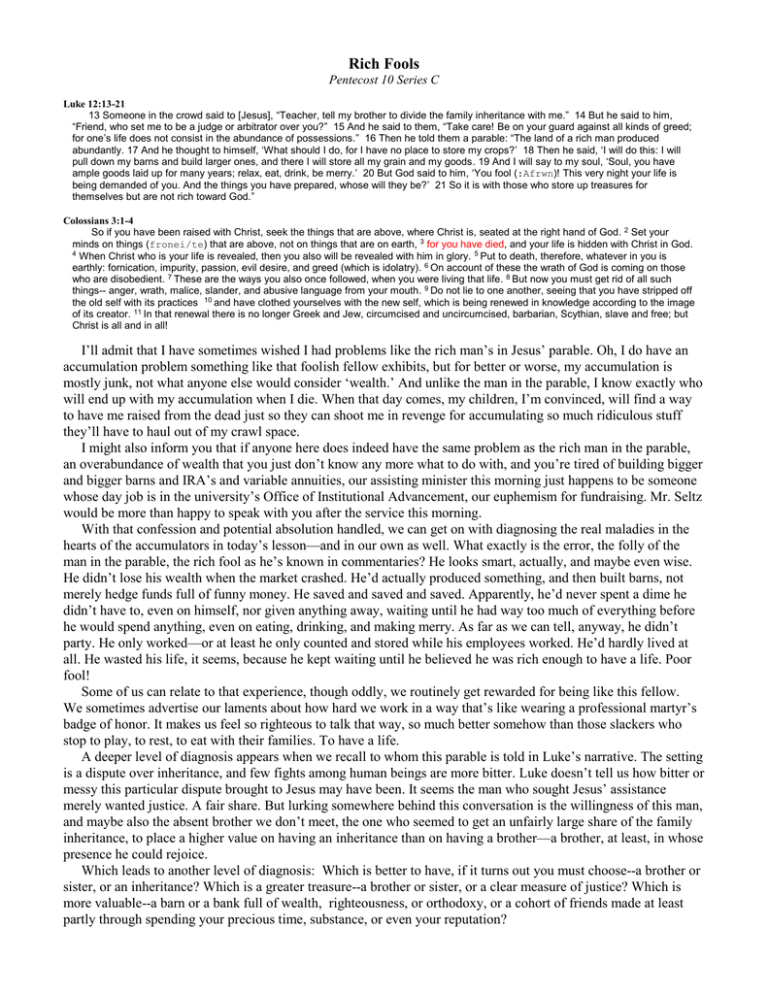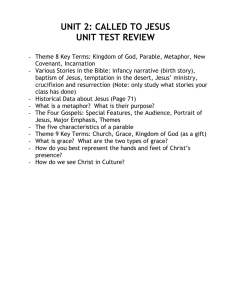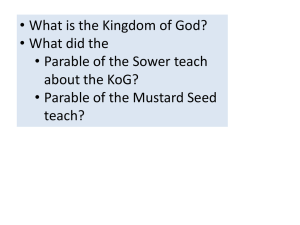Rich Fools Pentecost 10 Series C
advertisement

Rich Fools Pentecost 10 Series C Luke 12:13-21 13 Someone in the crowd said to [Jesus], “Teacher, tell my brother to divide the family inheritance with me.” 14 But he said to him, “Friend, who set me to be a judge or arbitrator over you?” 15 And he said to them, “Take care! Be on your guard against all kinds of greed; for one’s life does not consist in the abundance of possessions.” 16 Then he told them a parable: “The land of a rich man produced abundantly. 17 And he thought to himself, ‘What should I do, for I have no place to store my crops?’ 18 Then he said, ‘I will do this: I will pull down my barns and build larger ones, and there I will store all my grain and my goods. 19 And I will say to my soul, ‘Soul, you have ample goods laid up for many years; relax, eat, drink, be merry.’ 20 But God said to him, ‘You fool (:Afrwn)! This very night your life is being demanded of you. And the things you have prepared, whose will they be?’ 21 So it is with those who store up treasures for themselves but are not rich toward God.” Colossians 3:1-4 So if you have been raised with Christ, seek the things that are above, where Christ is, seated at the right hand of God. 2 Set your minds on things (fronei/te) that are above, not on things that are on earth, 3 for you have died, and your life is hidden with Christ in God. 4 When Christ who is your life is revealed, then you also will be revealed with him in glory. 5 Put to death, therefore, whatever in you is earthly: fornication, impurity, passion, evil desire, and greed (which is idolatry). 6 On account of these the wrath of God is coming on those who are disobedient. 7 These are the ways you also once followed, when you were living that life. 8 But now you must get rid of all such things-- anger, wrath, malice, slander, and abusive language from your mouth. 9 Do not lie to one another, seeing that you have stripped off the old self with its practices 10 and have clothed yourselves with the new self, which is being renewed in knowledge according to the image of its creator. 11 In that renewal there is no longer Greek and Jew, circumcised and uncircumcised, barbarian, Scythian, slave and free; but Christ is all and in all! I’ll admit that I have sometimes wished I had problems like the rich man’s in Jesus’ parable. Oh, I do have an accumulation problem something like that foolish fellow exhibits, but for better or worse, my accumulation is mostly junk, not what anyone else would consider ‘wealth.’ And unlike the man in the parable, I know exactly who will end up with my accumulation when I die. When that day comes, my children, I’m convinced, will find a way to have me raised from the dead just so they can shoot me in revenge for accumulating so much ridiculous stuff they’ll have to haul out of my crawl space. I might also inform you that if anyone here does indeed have the same problem as the rich man in the parable, an overabundance of wealth that you just don’t know any more what to do with, and you’re tired of building bigger and bigger barns and IRA’s and variable annuities, our assisting minister this morning just happens to be someone whose day job is in the university’s Office of Institutional Advancement, our euphemism for fundraising. Mr. Seltz would be more than happy to speak with you after the service this morning. With that confession and potential absolution handled, we can get on with diagnosing the real maladies in the hearts of the accumulators in today’s lesson—and in our own as well. What exactly is the error, the folly of the man in the parable, the rich fool as he’s known in commentaries? He looks smart, actually, and maybe even wise. He didn’t lose his wealth when the market crashed. He’d actually produced something, and then built barns, not merely hedge funds full of funny money. He saved and saved and saved. Apparently, he’d never spent a dime he didn’t have to, even on himself, nor given anything away, waiting until he had way too much of everything before he would spend anything, even on eating, drinking, and making merry. As far as we can tell, anyway, he didn’t party. He only worked—or at least he only counted and stored while his employees worked. He’d hardly lived at all. He wasted his life, it seems, because he kept waiting until he believed he was rich enough to have a life. Poor fool! Some of us can relate to that experience, though oddly, we routinely get rewarded for being like this fellow. We sometimes advertise our laments about how hard we work in a way that’s like wearing a professional martyr’s badge of honor. It makes us feel so righteous to talk that way, so much better somehow than those slackers who stop to play, to rest, to eat with their families. To have a life. A deeper level of diagnosis appears when we recall to whom this parable is told in Luke’s narrative. The setting is a dispute over inheritance, and few fights among human beings are more bitter. Luke doesn’t tell us how bitter or messy this particular dispute brought to Jesus may have been. It seems the man who sought Jesus’ assistance merely wanted justice. A fair share. But lurking somewhere behind this conversation is the willingness of this man, and maybe also the absent brother we don’t meet, the one who seemed to get an unfairly large share of the family inheritance, to place a higher value on having an inheritance than on having a brother—a brother, at least, in whose presence he could rejoice. Which leads to another level of diagnosis: Which is better to have, if it turns out you must choose--a brother or sister, or an inheritance? Which is a greater treasure--a brother or sister, or a clear measure of justice? Which is more valuable--a barn or a bank full of wealth, righteousness, or orthodoxy, or a cohort of friends made at least partly through spending your precious time, substance, or even your reputation? 2 And is that, perhaps, the same question as this: What is the difference between setting one’s mind on things below, and not on things above? How do you know if you’ve stored up treasures for yourself but are not rich toward God? What things would we set our minds on if we’d set them on things that are above? And what constitutes “riches toward God?” What do they think about in heaven, anyway? What riches do they tally up and then say unto their souls, “Soul, this is really, really good. Let’s eat, drink, and be merry”? If we take the scriptures, or Luke’s gospel in particular, as our clue, I guess we’d have to look at stories like the parables of the lost sheep and lost coin (Luke 15:1-10). Jesus says there’s more joy in heaven, and more partying among the angels, over one lost soul who comes home than over 99 who never strayed. A little later in this Pentecost season this year we’ll hear about the Rich Man and Poor Lazarus and later the crazy parable about the dishonest steward who cooked the books. The rich man made sure to send really great stuff out to his dumpster so Lazarus could survive out there in his driveway, but he never once invited Lazarus inside for a long talk. The crooked steward, however, went around making friends all over the place—with the master’s money. Smart guy, Jesus said. He knows what wealth is for. Sounds like God considers relationships more precious than gold, 401k’s, or good grades, or barns and cathedrals, or endowment levels and achievement awards, or any of the other things we set our minds on in our various callings. And on any given night of our lives, some of us would find ourselves in serious accounting difficulty if God were to come to us and say, “Fool! This night your soul is demanded of you. Who gets all your stuff, your money, your office, your spotless credit rating?” Oddly enough, the good news for us today begins with recognizing in our lessons another individual who tallied up his wealth one night and then heard God say to him, “Fool! This night your life is required of you.” This, of course, was the parable spinner himself—Jesus. I’m playing with words here, I must explain. The New Testament has two words for fool. The one in our text today means literally someone with a misdirected or mislaid mind, someone who obsesses over things that don’t matter. The other word for fool you will recognize as one we take straight into English—moron (µwron). It’s the word Paul uses to speak of the foolishness of the gospel, or the foolishness of God, and of Paul’s own being a fool for Christ. Those sorts of fools seem to have been made that way—or remade that way. According to the bean counters of this world, this fool, this moron Jesus, had wasted his life. He had no mutual funds, no Roth IRA’s, no pension plan, no teaching awards. His CV was only a list of references, and the whole lot of them were ordinary guys and some women from Galilee, only most of them didn’t know they were on the list because they couldn’t read or spell. Ah, but these folks were precious. They were Christ’s riches. They were his great, good fortune. When Jesus gave those friends of his the bread and wine of the Passover meal on the night before his life was required of him, and he said those things were his body and blood given for them, he was stating, among other things, what those friends were worth to him. They were worth his life. They were his life! They meant everything to him. He had no worth apart from them—or, my friends, apart from each of you. And how might this ultimate fool for God’s goodness and mercy answer the question in his own parable, “All your wealth you’ve prepared and stored, whose will it be? Who’s going to spend your fortune?” Well, goodness knows where the other sort of fools’ money gets squandered by those who inherit it. But Christ’s wealth, which is us, gets spent pretty wildly, too. By God, mostly, who goes on wild spending sprees, trying hard to get this lost one or that lonely, grieving one, or that idiot with the mislaid mind, back again into God’s barns, God’s home, God’s arms. And spending you—your strength, your substance, your time, yes, your life—to make it happen. It’s always God’s way to take the hardest questions God would ever ask of us, and in Christ to turn them on himself, lest we ever face a night of reckoning alone and without someone to help us make out the ledgers and tally sheets on our lives. For each of us that night will come, and a look about this room already now lets each of us say, “Whatever I have, or don’t have, in a barn somewhere, in this company, I’m ready. We’re ready. Together.” Indeed, that night of reckoning has already come. Paul reminds his readers in the Colossians reading we heard today, “You have already died—in baptism, and in those waters God daily makes and remakes us, over and over again. We’ll never hear God say, “Too bad, you sorry fool with a mislaid mind. . .,” but, “Come with me, all you morons with the mind of Christ, who risked all you have just to hang out with this crowd. Don’t you think it’s time we partied?” Frederick A. Niedner Chapel of the Resurrection, Valparaiso, IN 1 August 2010 Pent 10C 10.rtf




